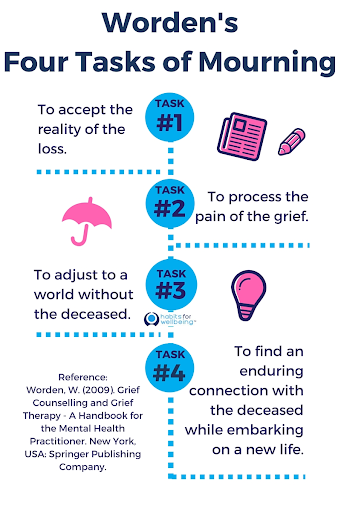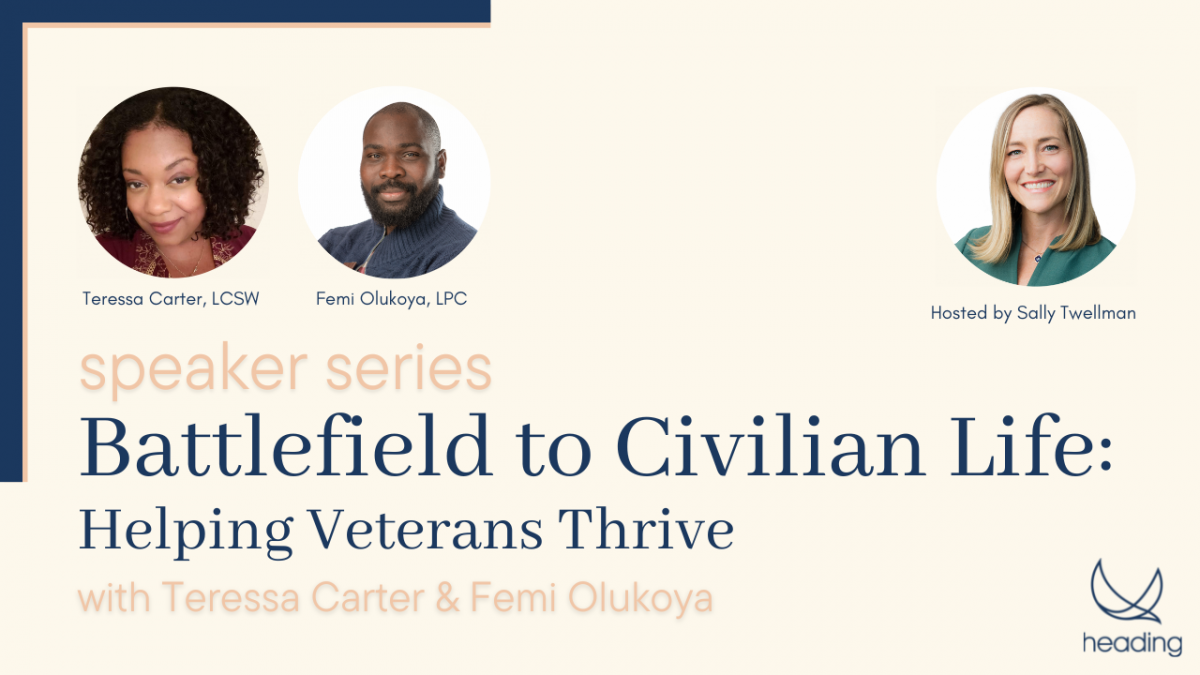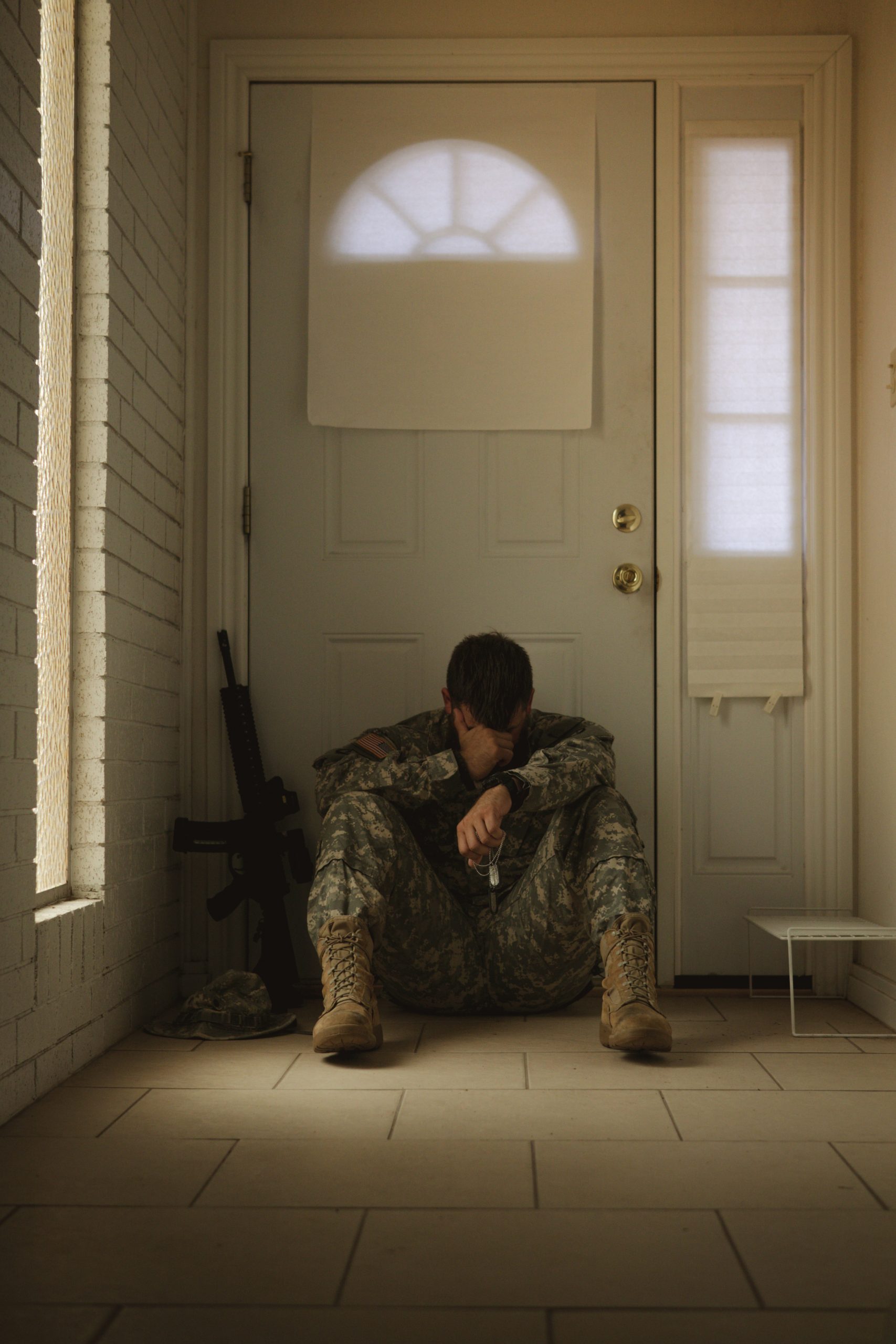This post was written by Patricia Hernandez, a therapist at Heading Health. Patricia is a licensed clinical social worker who strives to provide a diverse and culturally sensitive perspective.
“Culture encompasses religion, food, what we wear, how we wear it, our language, marriage, music, what we believe is right or wrong, how we sit at the table, how we greet visitors, how we behave with loved ones and a million other things.” Cristina De Rossi, Anthropologist at Barnet and Southgate College in London.
Mexican-American Culture and Grief
As a young child growing up in a Mexican-American household, culture was a significant part of my interpretation of death and the grieving and mourning process. For example, it was common to see ofrendas (an altar to honor the dead) year-round in my own home and those of my family members. These ofrendas were filled with pictures of deceased family and friends, religious candles, and saints. It was also commonplace to speak to the deceased, celebrate their birthdays, and express gratitude for their believed guidance and protection in our daily lives.
It was not until I was introduced to other cultures that I learned this expression of grief and mourning was, in some ways, unique to Mexican American culture.
Near the beginning of November, ofrendas grow to a larger scale in planning for Dia de  los Muertos. Dia de los Muertos is a celebration deeply rooted in Mexican culture celebrated annually on November 1 and 2. It is believed that on these dates, the deceased cross the realm of the spirit world into the world of the living, and ofrendas help guide them on their journeys.
los Muertos. Dia de los Muertos is a celebration deeply rooted in Mexican culture celebrated annually on November 1 and 2. It is believed that on these dates, the deceased cross the realm of the spirit world into the world of the living, and ofrendas help guide them on their journeys.
Although there is no right or wrong way to have an ofrenda, most utilize the elements of Earth, Wind, Fire, and Paper to guide the deceased on their return to the world of the living. These elements are represented on the ofrenda by having food, water, candles, and papel picado (i.e., colorful and intricately cut paper) that is said to move when the deceased are present.
Grief Vs. Mourning
 Though often used interchangeably, grief and mourning are notably different, and each plays a critical role in how we react to death and loss. Psychology Today distinguishes mourning as “the outward response to grief” such as creating altars, planting a tree, and playing a song. In contrast, grief is defined as “the emotional response to a loss,” such as feeling sad, hopeless, or angry.
Though often used interchangeably, grief and mourning are notably different, and each plays a critical role in how we react to death and loss. Psychology Today distinguishes mourning as “the outward response to grief” such as creating altars, planting a tree, and playing a song. In contrast, grief is defined as “the emotional response to a loss,” such as feeling sad, hopeless, or angry.
Grief and mourning also differ in terms of their stages or components. The often cited stages of grief are denial, anger, bargaining, depression, and acceptance. The parts of mourning are equally important but less well-known.
Psychologist J. William Worden divided the process of mourning into four tasks.
- Task 1 – “Accept the reality of the loss.” Here, an individual begins to move past the sense of disbelief by integrating death into their reality.
- Task 2 – “Process the pain of the grief,” where one begins to experience grief “emotionally, cognitively, physically, and spiritually.” Doing so assists in refraining from avoidance.
- Task 3 – “Adjust to the world without the deceased.” These adjustments occur externally, internally, and spiritually. Externally, one may take on new responsibilities, internally one creates an understanding of who they are now as an individual, and spiritually, one may develop a new understanding of their belief systems.
- Task 4 – “Find the balance of an enduring connection with the deceased while embracing a new version of a meaningful life.”
The tasks of mourning, much like the stages of grief, are nonlinear processes without a timeline.
The beliefs and traditions of Dia de los Muertos are a tangible example of how culture impacts not only grief but also mourning. Dia de los Muertos is a culturally accepted expression of love and remembrance that can help an individual through the tasks of mourning. It’s also a joyful time to commemorate the love that lives on for the deceased by creating altars, playing music, joining with loved ones, sharing memories, and continuing to honor the memory of the dead and integrate their memory into the present day. This allows one to outwardly embrace the connection with the deceased as they proceed with life.
Other Cultures and Grief
Cultural norms related to grief and mourning can both support and impede one’s own individual grieving and mourning process. According to Grief Speaks, “stoic attitudes are common” among Asian-American cultures, whereas “Haitians express grief with the physical manifestation of great emotion.” As there are differences in emotional expressions, there are also differences in timelines associated with mourning rituals. In Eastern Orthodox Christian funerals, it is normal to mourn loved ones “up to 40 days after the funeral.” Mourning periods can also vary depending upon the relation of the deceased. In some Islamic communities, the mourning period can even be extended to four months and ten days for those who are widowed, whereas in some Jewish communities, the mourning period can last up to one year after the death of a parent.
What’s “Normal” Grief?
 Cultural rituals related to the grief and mourning process can help create predictability in a time of uncertainty. For many, these cultural norms are a sense of support, whereas for others, it may be a source of conflict if their current beliefs, or the beliefs of the deceased, are misaligned with the cultural norms. So the question is, what is normal when it comes to grief and mourning?
Cultural rituals related to the grief and mourning process can help create predictability in a time of uncertainty. For many, these cultural norms are a sense of support, whereas for others, it may be a source of conflict if their current beliefs, or the beliefs of the deceased, are misaligned with the cultural norms. So the question is, what is normal when it comes to grief and mourning?
According to the DMS-5, a diagnostic and classification tool of mental disorders, a diagnosis of prolonged grief disorder is considered when “the loss of a loved one occurred at least a year ago for adults, and at least six months ago for children and adolescents.” Symptoms related to prolonged grief disorder can include intense loneliness, avoiding reminders of the deceased, and difficulty reintegrating into social groups, work, personal obligations, etc. With any diagnosis, it is also important to consider the symptomology in relation to social, cultural, or religious norms. However, not all grief leads to prolonged grief disorder. Depression, anxiety, and/or trauma, dependent on the events related to the death, can also occur. To meet the criteria for a diagnosis of any of the aforementioned conditions, impairment in daily functioning must be present.
Seek Support
 For as much togetherness as many cultural norms bring to the grieving process, grief is also individualized and sometimes isolating. But there are means to seek support to help ease the feelings of loneliness, confusion, and isolation that can accompany grief. Seeking support and comfort in the predictability and structure of cultural norms can help ease the process of grief and the tasks of mourning. Seeking therapy can also help normalize and validate the thoughts, emotions, behaviors, and timelines associated with grief and mourning in both a cultural and individual context.
For as much togetherness as many cultural norms bring to the grieving process, grief is also individualized and sometimes isolating. But there are means to seek support to help ease the feelings of loneliness, confusion, and isolation that can accompany grief. Seeking support and comfort in the predictability and structure of cultural norms can help ease the process of grief and the tasks of mourning. Seeking therapy can also help normalize and validate the thoughts, emotions, behaviors, and timelines associated with grief and mourning in both a cultural and individual context.
If you feel you need to see a mental health professional or could use help deciding which service is right for you, please give us a call at 805-204-2502 or fill out an appointment request here. We have a wide variety of providers, including therapists, psychiatrists, nurse practitioners, and nutritional therapists, who can see you in as little as one day via teletherapy.




 Veteran’s Day allows us to explore and assess how we can better support our veterans, especially when navigating their mental health. Recent research suggests 11 to 20 percent of veterans experience post-traumatic stress disorder (PTSD) in a given year. Suicide rates of military service members and veterans are also at an
Veteran’s Day allows us to explore and assess how we can better support our veterans, especially when navigating their mental health. Recent research suggests 11 to 20 percent of veterans experience post-traumatic stress disorder (PTSD) in a given year. Suicide rates of military service members and veterans are also at an 

 Though often used interchangeably, grief and mourning are notably different, and each plays a critical role in how we react to death and loss. Psychology Today distinguishes mourning as
Though often used interchangeably, grief and mourning are notably different, and each plays a critical role in how we react to death and loss. Psychology Today distinguishes mourning as  Cultural rituals related to the grief and mourning process can help create predictability in a time of uncertainty. For many, these cultural norms are a sense of support, whereas for others, it may be a source of conflict if their current beliefs, or the beliefs of the deceased, are misaligned with the cultural norms. So the question is, what is normal when it comes to grief and mourning?
Cultural rituals related to the grief and mourning process can help create predictability in a time of uncertainty. For many, these cultural norms are a sense of support, whereas for others, it may be a source of conflict if their current beliefs, or the beliefs of the deceased, are misaligned with the cultural norms. So the question is, what is normal when it comes to grief and mourning?  For as much togetherness as many cultural norms bring to the grieving process, grief is also individualized and sometimes isolating. But there are means to seek support to help ease the feelings of loneliness, confusion, and isolation that can accompany grief. Seeking support and comfort in the predictability and structure of cultural norms can help ease the process of grief and the tasks of mourning. Seeking therapy can also help normalize and validate the thoughts, emotions, behaviors, and timelines associated with grief and mourning in both a cultural and individual context.
For as much togetherness as many cultural norms bring to the grieving process, grief is also individualized and sometimes isolating. But there are means to seek support to help ease the feelings of loneliness, confusion, and isolation that can accompany grief. Seeking support and comfort in the predictability and structure of cultural norms can help ease the process of grief and the tasks of mourning. Seeking therapy can also help normalize and validate the thoughts, emotions, behaviors, and timelines associated with grief and mourning in both a cultural and individual context. 






 The pandemic catapulted many of us into a new arena with work, work from home. At first, the sweatpants dress code for Zoom calls felt luxurious, and a midday nap and fun lunchtime snack felt exciting. But almost 3 years later the allure of working from home seems a little less enthralling. Earlier this year,
The pandemic catapulted many of us into a new arena with work, work from home. At first, the sweatpants dress code for Zoom calls felt luxurious, and a midday nap and fun lunchtime snack felt exciting. But almost 3 years later the allure of working from home seems a little less enthralling. Earlier this year, 




